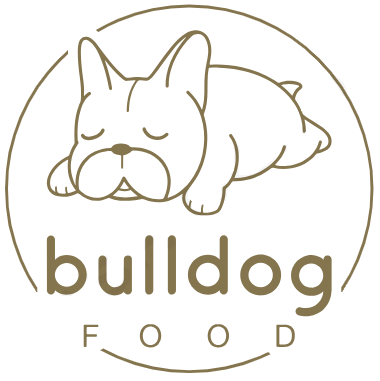
French Bulldogs, or “Frenchies,” are known for their playful and affectionate nature. Understanding when do french bulldogs calm down will begin to calm down is crucial for proper training and creating a harmonious living environment. This article will explore the various factors affecting the calmness of French Bulldogs, their developmental stages, and tips for managing their energy levels.
Developmental stages and temperament changes in French Bulldogs
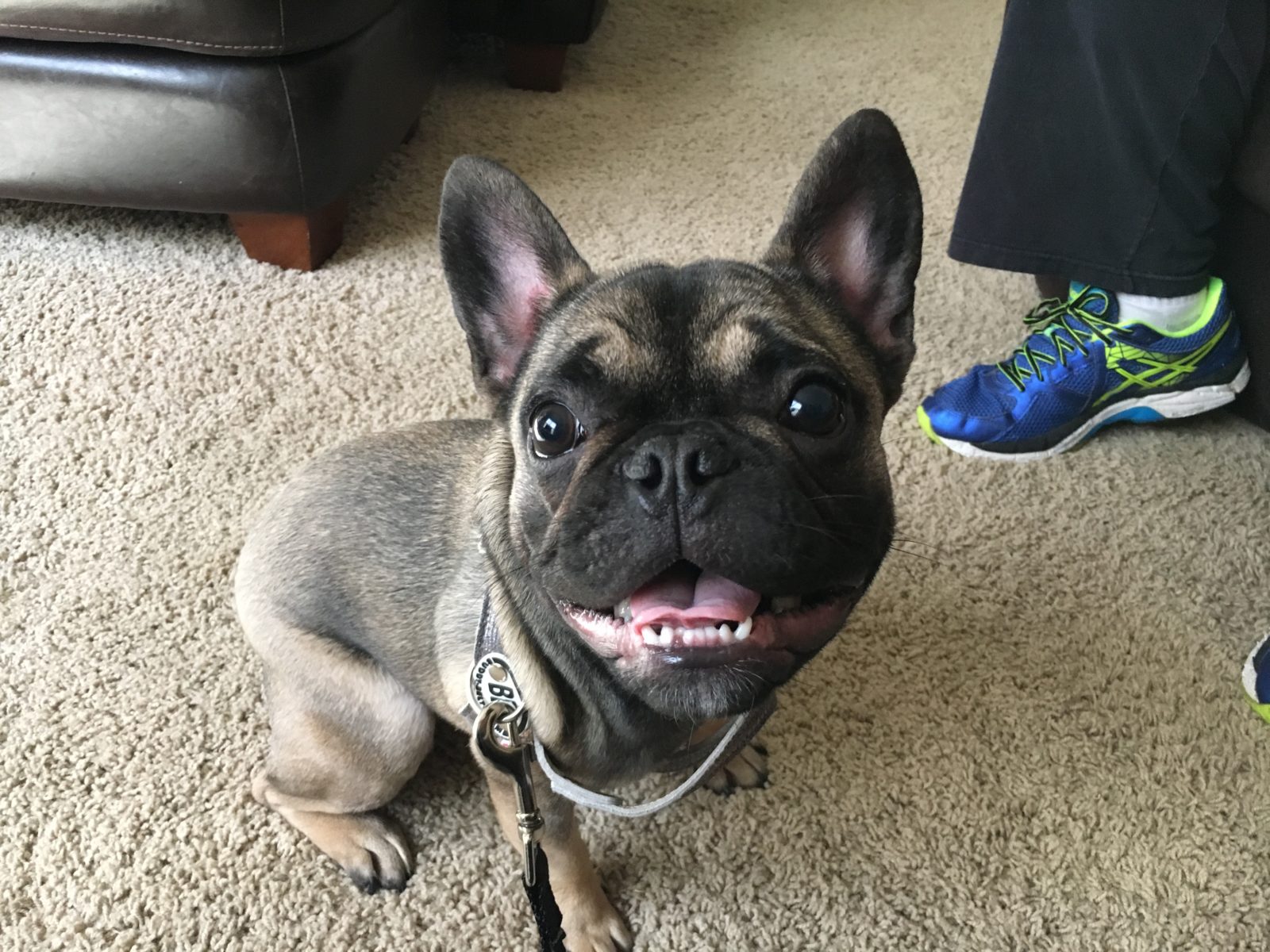
Puppy Stage (0-6 months)
During the first six months of life, French Bulldog puppies are typically very active and curious. This is a critical period for socialization and training, as their experiences during this stage can significantly influence their behavior in the future. Puppy Frenchies tend to have short bursts of energy followed by periods of rest. They require a lot of attention and consistent training to develop good habits and manners.
Juvenile Stage (6-12 months)
As French Bulldogs move into the juvenile stage, their energy levels remain high. They continue to be playful and may test boundaries as they explore their independence. It is essential to maintain a routine with plenty of physical activity and mental stimulation to keep them engaged. Socialization should continue during this stage to ensure they grow into well-adjusted adults.
Adolescence (1-2 years)
Adolescence can be a challenging time for French Bulldog owners. These dogs may become stubborn and exhibit increased energy levels. Patience and persistence in training are crucial during this period. Consistent exercise, structured routines, and ongoing socialization will help manage their energy and prevent undesirable behaviors.
Adulthood (2-4 years)
By the age of two, many French Bulldogs begin to show signs of calming down. They still enjoy playtime but tend to have better control over their energy levels. At this stage, they are more receptive to training and can enjoy a balanced mix of activity and relaxation. Providing them with regular exercise, mental challenges, and positive reinforcement can help further stabilize their temperament.
Senior Stage (4+ years)
As French Bulldogs enter their senior years, they naturally become more relaxed and less active. Health issues may arise, requiring more attention to their physical condition and diet. Despite their decreased energy levels, it is important to keep them mentally stimulated and engage them in gentle exercise to maintain their overall well-being. Seniors benefit from a calm and predictable environment, which helps them stay happy and healthy.
When do french bulldogs calm down

Determining the exact age at which French Bulldogs begin to calm down can vary significantly from one dog to another. However, a general timeline can be observed based on the developmental stages of these affectionate canines.
Early Adulthood (2-3 years)
During early adulthood, typically around 2 to 3 years of age, many French Bulldogs start to exhibit signs of mellowing out. While they still possess a playful and spirited nature, their energy becomes more predictable and manageable. This phase is characterized by:
- Behavioral Adjustments
Frenchies start to develop a deeper understanding of household rules and expectations. Their previously boundless energy starts to wane slightly, making them less prone to frequent bouts of hyperactivity.
- Training Receptiveness
At this age, they are more likely to respond positively to consistent training efforts. Owners might notice improved obedience and fewer instances of boundary-pushing or rebellious behavior seen during the adolescent stage.
- Routine Preference
Early adult French Bulldogs benefit greatly from established daily routines that include balanced playtime, training sessions, and rest periods. Predictable patterns help them maintain a calm demeanor throughout the day.
Middle Adulthood (3-5 years)
As French Bulldogs enter their middle adult years, typically between 3 and 5 years of age, their calmness usually becomes more pronounced. This stage is characterized by:
- Increased Maturity
Frenchies demonstrate significant emotional and behavioral maturity. They are more likely to seek companionship and cuddles rather than incessant play.
- Stable Energy Levels
Energy levels plateau, making their activity more structured. They start to enjoy leisurely activities such as short walks or gentle play rather than high-intensity games.
- Greater Affection
During middle adulthood, these dogs often show increased affection towards their owners, preferring close contact and bonding activities over solitary play. This makes them ideal companions for a more relaxed lifestyle.
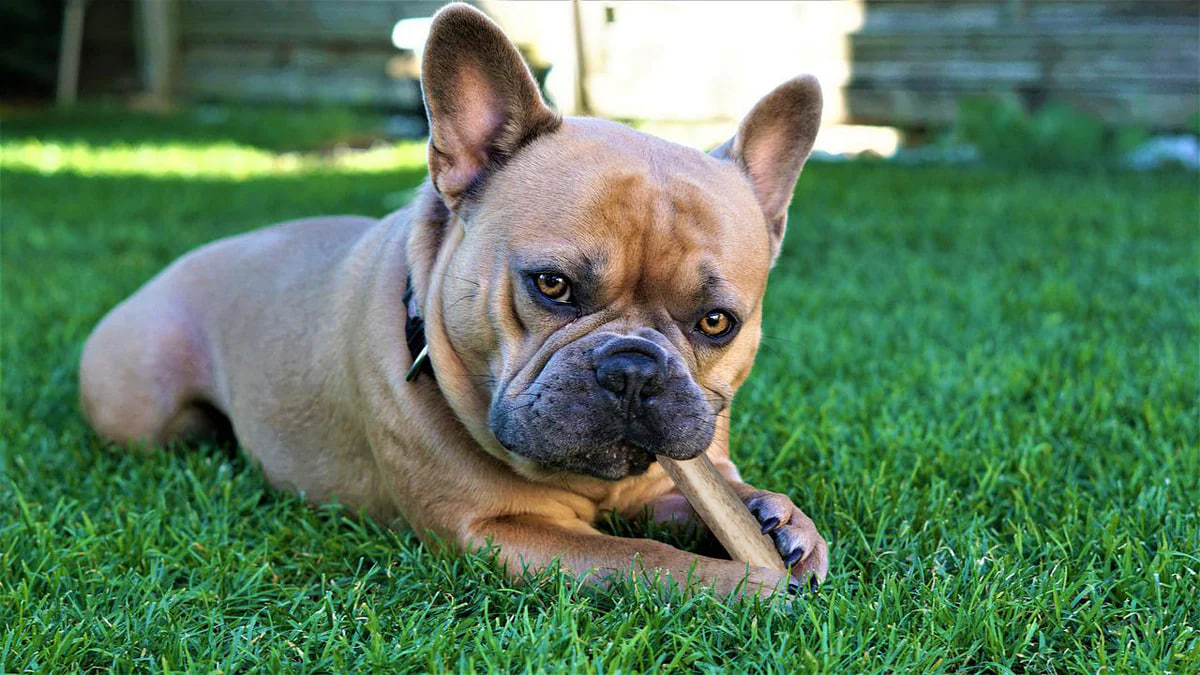
Senior Years (5+ years)
Entering their senior years at around 5 years and older, French Bulldogs tend to exhibit a calm and composed temperament. This period is marked by:
- Significant Decrease in Energy
Senior Frenchies generally display lower energy levels and more prolonged periods of rest and relaxation. They might enjoy simple activities such as lounging around or gentle strolls rather than vigorous play.
- Health Awareness
It is crucial to monitor their health closely during this stage. Regular veterinary check-ups, a well-balanced diet, and age-appropriate exercises ensure they remain healthy despite reduced activity levels.
- Mental Stimulation
To keep senior French Bulldogs sharp and content, owners should engage them in activities that stimulate their minds. Puzzle toys, scent games, and light training sessions are excellent ways to maintain their mental well-being.
In conclusion, while the calming process can vary, most French Bulldogs show significant signs of calming down between the ages of 2 to 5 years. Providing consistent routines, ample affection, and appropriate mental and physical stimulation throughout their lives ensures they grow into well-adjusted, calm companions.

Training French Bulldogs to be calmer
As a seasoned pet expert who has worked with countless French Bulldogs, I can attest that proper training is essential in helping these energetic pups become calmer, more balanced adults. While Frenchies are known for their playful nature, with the right approach, owners can guide them towards a more settled demeanor. In this section, we’ll explore effective training methods that have proven successful in managing French Bulldog behavior.
Establishing daily routines and schedules
Consistency is key when it comes to calming a French Bulldog. Implementing a structured daily routine helps these dogs understand what to expect, reducing anxiety and hyperactivity. Set regular times for meals, walks, play sessions, and rest periods. This predictability can significantly contribute to a calmer demeanor over time.
Basic training techniques
Start with fundamental obedience training early on. Commands like “sit,” “stay,” and “come” not only make your Frenchie more manageable but also provide mental stimulation. Use short, frequent training sessions to accommodate their sometimes limited attention span. Remember, patience is crucial – French Bulldogs can be stubborn, but they’re also eager to please.
Using rewards and positive reinforcement
Positive reinforcement is particularly effective with French Bulldogs. Reward good behavior with treats, praise, or playtime. This approach encourages them to repeat desired behaviors and helps build a strong bond between dog and owner. Avoid harsh corrections, as Frenchies can be sensitive and may become anxious or defensive.
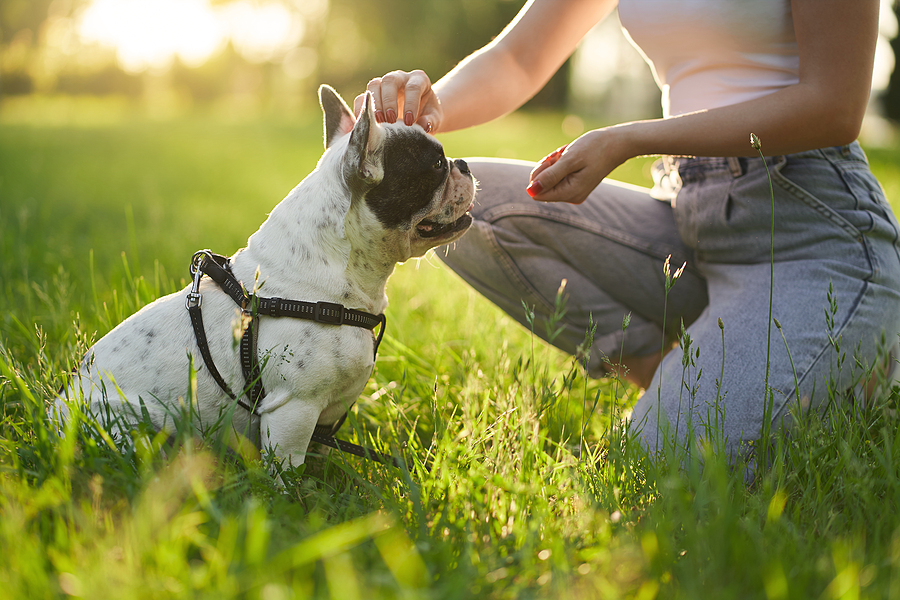
Addressing common behavioral issues
While French Bulldogs are generally good-natured, they can develop behavioral issues that may impact their calmness. As an experienced pet expert, I’ve encountered and helped resolve many of these issues. Let’s discuss some common problems and their solutions.
Dealing with separation anxiety
French Bulldogs are prone to separation anxiety due to their strong attachment to their owners. Gradual desensitization to your absence, coupled with positive associations (like leaving a treat-filled toy), can help alleviate this issue. In severe cases, consulting with a professional dog behaviorist may be necessary.
Reducing chewing and destructive behaviors
Destructive chewing often stems from boredom or anxiety. Provide appropriate chew toys and increase physical and mental stimulation. If the behavior persists, it’s essential to rule out any underlying health issues with a veterinary check-up.
Controlling excessive barking
While French Bulldogs aren’t known for being excessive barkers, some may develop this habit. Identify the trigger for barking and work on desensitization. Teaching the “quiet” command and rewarding calm behavior can be effective in managing this issue.
Health care to improve temperament
A French Bulldog’s physical health directly impacts their behavior and temperament. As a reviewer who has collaborated with veterinarians specializing in brachycephalic breeds, I can’t stress enough the importance of proper health care for these dogs.
Balanced nutrition
A well-balanced diet tailored to your French Bulldog’s specific needs can significantly influence their behavior. Consult with your veterinarian to choose a high-quality dog food that supports their health and energy levels. Be mindful of potential food allergies, which are common in the breed and can affect behavior.
Regular health check-up schedule
Establish a routine for regular veterinary check-ups. These visits can catch potential health issues early, preventing them from escalating into problems that affect your Frenchie’s temperament. Pay special attention to respiratory and joint health, as these are common concern areas for the breed.
Addressing health issues affecting behavior
Some health problems, such as allergies, skin irritations, or gastrointestinal issues, can cause discomfort that manifests as restlessness or irritability. Work closely with your vet to address any health concerns promptly to ensure your French Bulldog remains comfortable and calm.
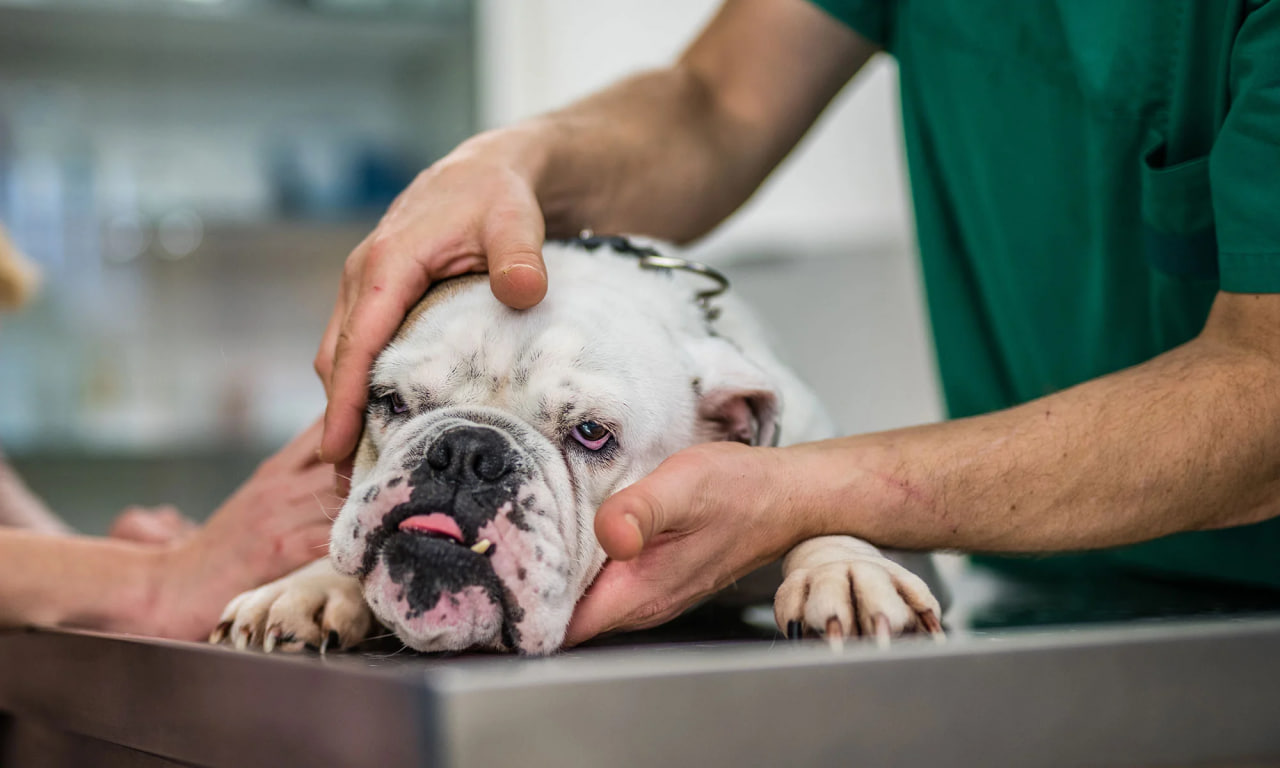
FAQs
Q : How can I help my French Bulldog to calm down?
A : Providing regular exercise, mental stimulation, and a structured routine can help your French Bulldog burn off excess energy and promote calm behavior. Additionally, creating a calm environment and using positive reinforcement training techniques can also contribute to their overall relaxation.
Q : Do female and male French Bulldogs calm down at different rates?
A : While there can be some variation between individual dogs, gender generally does not significantly affect when French Bulldogs calm down. Both male and female Frenchies typically show a decrease in hyperactivity as they mature into adults.
Q : When do French Bulldogs stop growing?
A : French Bulldogs typically reach their full adult size and stop growing between the ages of 9 to 12 months. During this period of growth, they undergo significant physical development, including reaching their final height and weight. If you’re curious about when do french bulldogs stop growing , this timeframe marks the completion of their major growth stages.
Conclusion
Understanding when do french bulldogs calm down involves considering multiple factors, including genetics, gender, and rearing conditions. By recognizing the different developmental stages and implementing effective exercise and training techniques, you can help your French Bulldog transition into a calm and well-behaved adult.
For personalized advice and more tips on managing your French Bulldog’s energy levels, consider booking a consultation with a professional dog trainer. Remember, patience and consistency are key to raising a happy and calm French Bulldog.

At bestfoodforfrenchbulldog.net, Frenchie Feast Co is dedicated to providing the best information and advice on nutrition and food for French Bulldogs. We understand that every dog has unique nutritional needs, especially breeds like the French Bulldog. Therefore, we continually research and seek out optimal nutritional solutions.
CEO Lincoln Martin is not only the founder of BestDogFoodForDachshunds.net but also a proud Dachshund parent. With a deep understanding of the unique dietary needs of Dachshunds, Lincoln Martin is committed to helping fellow dog owners make informed decisions about their pets’ nutrition.
Driven by a love for animals and a desire to share valuable insights, our team works tirelessly to research and curate the most reliable and up-to-date information on dog food, health, and care. From reviewing the latest products to offering practical tips and advice, we strive to be your trusted source for everything Dachshund-related.
Whether you’re a new Dachshund owner or a seasoned enthusiast, you can trust the expertise and dedication of the team at BestDogFoodForDachshunds.net to support you on your journey of providing the best care for your furry friend.
